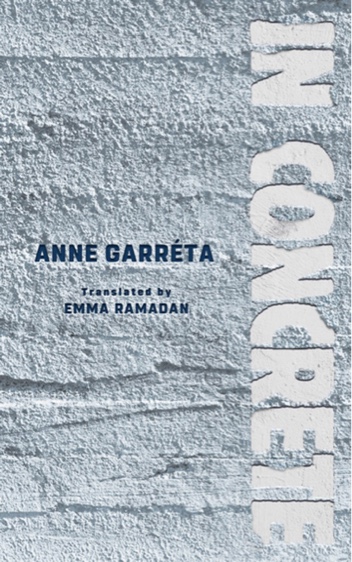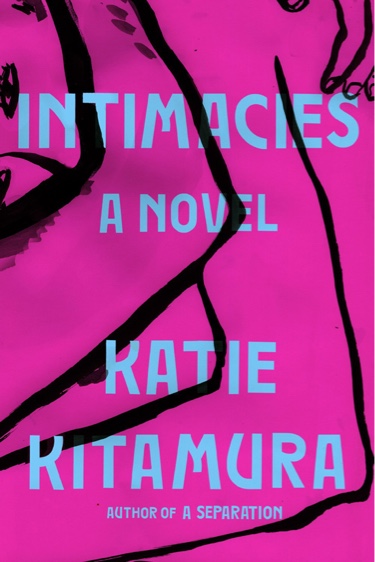-
March 21, 2022
Quarterfinals
-
Anne Garréta
4In Concrete
v.
2IntimaciesKatie Kitamura
-
Judged by
Alex Barasch
When I started Katie Kitamura’s Intimacies, in the last week of December, I was already preoccupied by questions of closeness. With the world shrinking again in response to the Omicron variant, and friends I’d expected to see holed up in their own homes or stranded in other cities, I felt dislocated and a little bereft. Covid, mercifully, does not feature in Intimacies, but the unnamed narrator’s mood in those opening pages—detached from her surroundings and to a certain extent from herself—seemed apt. Cast adrift by the death of her father, she has left New York for the Hague, where she accepts a fixed-term contract as an interpreter at the International Criminal Court. Her job is to “throw down planks” across the “great chasms beneath words,” relaying both the substance of a witness’s speech and the feeling behind it. Because the Court deals with crimes against humanity, she finds herself describing, in exhaustive detail, “matters that were, outside, generally subject to euphemism and elision.”
There’s little room in this dynamic for the translator’s own emotions or sense of self, which is part of what makes her so good at it. Even in her personal life, the narrator’s instinct is to remain on the periphery, watching dramas unfold from a distance. She moves through the plot in a fugue, fixating on a brutal mugging in a friend’s neighborhood or speculating about her new lover’s estranged wife, who may or may not want him back. When her boss takes her out to lunch, she becomes engrossed by an affair unfolding at another table. Her passivity can be maddening, but this keen observation of human behavior—often at a near-anthropological remove—is one of Intimacies’ great strengths. The narrator is forever revising her opinions and working to discern the motivations of the people around her: the philandering bookseller, the slimy defense attorney, the war criminal at the Court who adopts her as his favorite. (If she’s a cipher, at least she keeps interesting company.)
For much of the novel, I was swept along by crisp, evocative prose and the tension rippling below the surface. Occasionally, I hit a snag: Intimacies has a tendency to abandon characters when they no longer serve its purposes, treating them less as individuals than object lessons. The novel’s chief interest seems to lie in the power of appearances and the cost of maintaining them. Intimacy, which punctures the illusion, can come as a relief, an imposition, or an unpleasant shock—on closer examination, the narrator finds both people and places marked by “alarming fissures.” Despite this, the book ends with an infusion of hope that moved me. Just as she seems poised to leave the Hague, never having truly felt at home there, she learns that she had spent time in the city before, as a child. The sudden prospect of belonging seems impossible to capture in words. Haltingly, she shares the memory with someone anyway: a plank thrown across the chasm in an effort to be understood.
Bright and warm, the covers of these Memo Books are heavily debossed with graphic patterns based on flowers that are among the very first to appear each spring, and then stamped with three luscious, reflective foils. The dot-graph insides are made from a superb paper from Strathmore.
Available now in 3-Packs and as part of a year-long subscription.
If Intimacies was deliberately bloodless, Anne Garréta’s In Concrete is all viscera: Characters spit in each other’s eyes, urinate in fuel tanks, and fling manure at their enemies. The narrator is a 12-year-old nicknamed Fignole, raised along with a sister, Angélique, in the French countryside. (Fignole is never explicitly gendered, although I’ve seen other readers describe them as a daughter or a son with equal certainty—an interesting Rorschach test in itself.) Their father, a tinkerer who considers both “crescent wrench” and “bitch” to be “technical terms of the trade,” has passed down his obsession with home improvement as well as his noxious machismo. Fignole’s speech is inflected with misogyny, homophobia, and jingoism; as they’re at pains to remind us, they are neither a “pussy” nor a “pansy pedo,” nothing like the “English sissies” or the “Americunts.” When a quest to “muddernize” the house goes awry, Angélique is submerged in concrete—a crisis so dire that the form of the novel itself breaks down. But our would-be hero soon cheerfully digresses again, deflating any sense of urgency. They flit between ill-fated renovations, schoolyard battles, and other, more surreal encounters. There is no sex, but the innuendo is endless.
Here I should confess a minor allergy to puns. I can appreciate them under certain circumstances—Ali Smith, for example, should by all means keep doing what she’s doing—but Garréta’s youthful protagonist makes for juvenile wordplay. Malaprops like “ampootated” and “electrotooted,” and the collapse of “it’s not” into “snot,” feel more exhausting than witty, particularly the third or fourth or fifth time they’re invoked. To be sure, there are flashes of bravura—and, in an age of cool, spare prose, there’s something to be said for work that rewards and in fact demands closer reading. A single line from In Concrete can spin out in any number of directions, freighted with allusions to myth, literature, and military history. But if these eddies can be pleasurable at the level of the sentence, they also make it near-impossible for the novel as a whole to cohere.
Perhaps because I was fresh from Intimacies, with its interpreter protagonist, the work of In Concrete’s translator, Emma Ramadan, was never far from my mind as I read. Her explanatory postscript—an account of the choices she made, informed by long conversations with Garréta, who at one point instructed her to “get drunk and see if we get good puns”—fascinated me in a way the preceding 200-odd pages had not. Give me that book, tracing the relationship between an eccentric Oulipian and the woman tasked with rendering her comprehensible to the English-speaking world! Such human dramas are more compelling to me than empty experimentation. The escape from Fignole, whose parting words for the reader are “Cliturgy wrapped in a diddle inside a chinchilla,” also came as a relief. Main characters don’t have to be likable—I often enjoy it when they’re not—but the unique pleasure, and potential hazard, of first-person narration is the hours spent inside their heads. Reading Intimacies is like meeting a sharp-eyed stranger at a party: you want to be in her orbit just to hear what she makes of the other guests, and what she might let slip about herself. In Concrete places you at the mercy of a kid with a blinkered worldview and a limited attention span. Big ideas are gestured at, grand claims are made, and the sheer absurdity of the performance might entertain you for a time—but once the novelty wears off, you feel impatient to get back to the grown-ups.
Match Commentary
By Valerie Koehler & Meave Gallagher
Meave Gallagher (she/her): Bonjour, tout le monde! It’s Day 10 and we are getting weird in the commentary booth with Valerie Koehler, proprietor of Blue Willow Bookshop in West Houston, Texas. Valerie, before we dive into a linguistic rabbit warren, why don’t you introduce yourself to the nice people?
Valerie Koehler (she/her): I own and manage a neighborhood bookshop in Houston, always corralling a staff who are strongly opinionated about books that they have read. I was introduced to the ToB by a former staffer who read widely (but sadly never wanted to answer the phone!). Several staffers and customers love to talk about the books that make the list and why a book moves to the next round. I read all genres. I also read tons of books for young readers.
Meave: “Always corralling a staff who are strongly opinionated about books”—swap “commenters” for “staff” and I think we have… very similar jobs. Well, I have read this judgment more times than I read either book involved—Intimacies: 1; In Concrete: 0—so I didn’t have a vested interest in the winner. Although if I’d realized In Concrete was written by one of only a tiny handful of Oulipolian women, I might’ve made more of an effort to find it. (Pretentiously, I have a longtime thing for Queneau.) Have you read these novels? What do you think about Judge Barasch giving Intimacies the nod?
Valerie: I have read Intimacies and thoroughly enjoyed it. I think of it as a quiet novel. People need to know that I read all over the map. I have not read In Concrete.
Meave: Like many of us, evidently, I share Judge Barasch’s “minor” allergy to puns, and the thought of a whole book of childish malapropisms—well, I can see how the wordplay the judge describes could become obnoxious pretty quickly. Are you a pun person? They’re just so divisive.
Valerie: While I love books that break the barriers, I too am not a pun person. I also don’t like when the structure of the novel overtakes the story. That seemed to be Judge Barasch’s feeling as well.
Meave: But if, as the judge says, In Concrete’s neologisms “can spin out in any number of directions, freighted with allusions to myth, literature, and military history,” to me that sounds so much more interesting than Intimacies’ narrator’s “deliberate bloodlessness” and “maddening passivity.” Of course, we get a perfectly reasonable explanation of what Judge Barasch liked about it, too. What do you think—are you buying the judge’s interpretation of our lonely interpreter?
Valerie: I completely buy it. Don’t we all observe (at least for the most part) from a distance? Do we need to feel that the narrator is too reserved? Our narrator feels real to me. The only thing that irritates me is sloppy writing and a boring story.
Meave: Let’s return to In Concrete. I hadn’t heard of it or the author before this year’s long list, and I couldn’t find the book at any of my libraries, which I now find doubly disappointing, having nursed some dreams about studying Oulipo while doing my undergrad. These novels aren’t reawakening any youthful dreams for you, are they? Are you a language nut?
Valerie: Yes, I am a kind of a language nut. But don’t get me started on the “clever” novel. I think that is what our judge is weighing in on here. Don’t let it get in the way of the story.
Meave: A novel can certainly be too clever for its own good. I’m intrigued by the judge’s assertion that a book about “the relationship between an eccentric Oulipian and the woman tasked with rendering her comprehensible to the English-speaking world” would be preferable to In Concrete—I would absolutely read that book.
Valerie: I’m thinking of Paul Harding’s Tinkers; so many people questioned this fever dream of a book. And no youthful dreams for me (old as I am!).
Meave: So, did the judgment change your opinion of Intimacies?
Valerie: I love reading what the judges have to say about all the novels. But I have never disagreed with any of their decisions. It doesn’t make one book better than the other in the end. Let’s be happy that we have so many choices to read!
Meave: Hang on: You’re actually saying you’ve never disagreed with any of the judges’ decisions? Commenters, if you are waking up to find you’ve fainted on a hard surface, please consider seeking medical attention. Is this what being a longtime bookseller does to you?
Valerie: Yes, this is what being a long time bookseller does. It is also what being a lifelong reader does to you. You see gray—not black-and-white. Yes, not every book is for every reader, but there is at least one book for everyone. I try to be open-hearted and kind to strangers, but if you’ve ever caught me in the back room, there may be some harsh words.
Meave: Let us vow not to catch you in the back room, then!
Valerie: Those harsh words are for people—not my staff—getting in the way of allowing people to choose the books they want to read. I don’t have any favorites on this list. I admire all of the creativity! And I can’t wait to read more of them and the judgments. I also love the opportunity to discuss new books with friends.
Meave: Usually when someone “doesn’t have favorites,” they mean they don’t have any favorites still in the Tournament; you, Valerie, I believe sincerely mean it. Well, I suppose all that’s left to do is thank you very much for discussing this judgment with me today! This has been a real lesson in generous criticism, which I wouldn’t mind seeing a little more of in the various and sundry reviews of books in the world. If people want to find out more about your bookstore, where can they find you?
Valerie: I love the term “generous criticism.” Over the years I have read scathing reviews and honest opinions. I am in favor of the honest opinion. When we meet, we will not always agree, but I will value your outlook and hopefully take some lessons home with me. People can find my opinionated shop at bluewillowbookshop.com. But don’t think it’s all me. It’s our merry band of people who do not always agree that make it fun.
New 2022 Tournament of Books merch is now available at the TMN Store. As a reminder, Sustaining Members receive 50 percent off everything in our store. To find out why we’re asking for your support and how you can become a Sustaining Member, please visit our Membership page. Thank you.
Welcome to the Commentariat
Population: You
To keep our comments section as inclusive as possible for the book-loving public, please follow the guidelines below. We reserve the right to delete inappropriate or abusive comments, such as ad hominem attacks. We ban users who repeatedly post inappropriate comments.
- Criticize ideas, not people. Divisiveness can be a result of debates over things we truly care about; err on the side of being generous. Let’s talk and debate and gnash our book-chewing teeth with love and respect for the Rooster community, judges, authors, commentators, and commenters alike.
- If you’re uninterested in a line of discussion from an individual user, you can privately block them within Disqus to hide their comments (though they’ll still see your posts).
- While it’s not required, you can use the Disqus <spoiler> tag to hide book details that may spoil the reading experience for others, e.g., “<spoiler>Dumbledore dies.<spoiler>”
- We all feel passionately about fiction, but “you’re an idiot if you loved/hated this book that I hated/loved” isn't an argument—it’s just rude. Take a breath.



